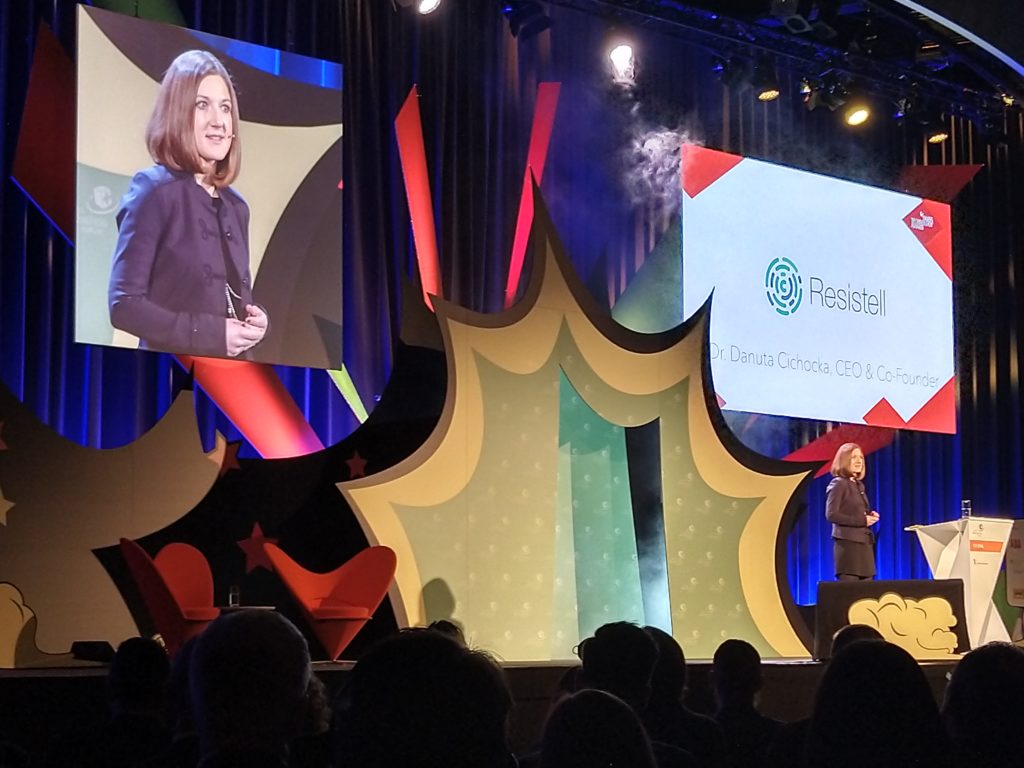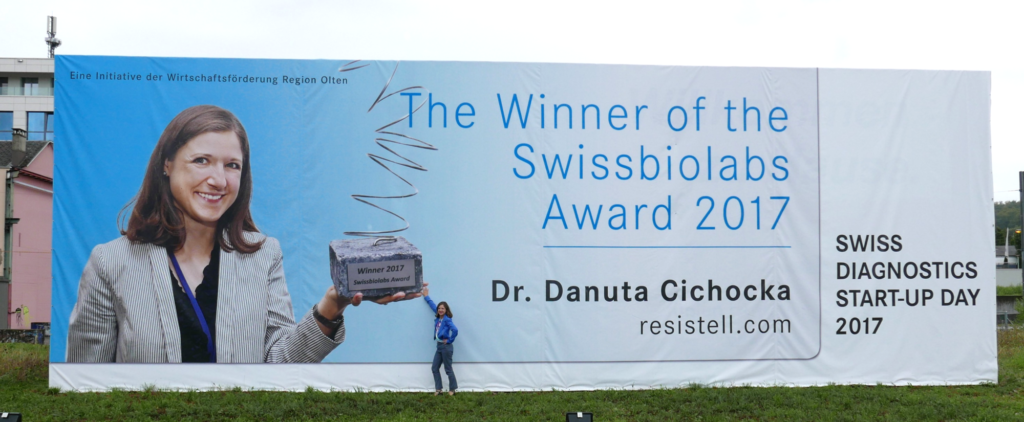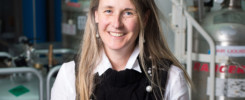Danuta Cichocka often says she is lucky. But one should say she is a visionary. Danuta Cichocka is CEO and co-founder of Resistell.

Her moto: always be prepared for success.
Resistell is aimed at addressing one of today’s biggest challenges to global health: antibiotic resistance. The startup patented technology measures bacterial vibration to deliver antibiotic susceptibility results in hours instead of days, allowing clinicians to find the right antibiotic on time and reducing the spread of antibiotic resistance.
We met a brilliant scientist and entrepreneur. Get into her story and learn key tips for your entrepreneurial journey.
Can you describe your path to becoming a scientist? What and / or who helped you in your professional choices?
Science was deeply rooted inside me since I was a child. Actually, I took part in my first science competition during primary school – in chemistry. When I was 14, I won the national competition in chemistry and another one when I was 15. It was still the time when there were entry exams into secondary school. Thanks to the fact that I had won these national competitions, I could enter secondary school without examination. That was quite a big achievement at a very young age.
My parents are engineers but none of them is a scientist. No one in my family was a scientist. My passion with life sciences started with chemistry, then I became more interested in biology. Life sciences and biology were always on top of my interests. When I started University in 1999, I chose something which was pretty new at that time: interdisciplinary studies in natural sciences, with a focus on environmental protection. At that time in Poland, environmental protection was a new discipline. Its diversity was really interesting: we started with basic sciences like mathematics, physics and moved on to geology, microbiology, biology, zoology and so on. This interdisciplinary approach was captivating and led to a much deeper understanding of natural sciences and how they interact with each other.
I have been passionate about the interactions at the interface of different disciplines for most of my life. Interdisciplinarity is also something we pursue in our company.
At Resistell, we work at the interface of engineering, nanosciences, physics, microbiology and medicine. Now, we are also adding an artificial intelligence component: our data analyst is developing completely new algorithms to investigate the microbiology data using machine learning approaches. This is fascinating! You find so much more in the data when you use a combination of different disciplines.
Should you encourage young girls to get into science, what would you say?
Science was deeply rooted inside me. What really helped is that nobody discouraged me. There is a lot of talk about what we should do to encourage girls to become scientists. I think that if someone is really passionate about science, they will find a way themselves. Encouraging may not make much sense.
What is key in my opinion is not to discourage young girls who are passionate about science, but to support them and give them enough confidence so that they can go for it.
Women who are really passionate about science may often think that this is not a suitable profession for women, that this is a male world. Very often, young women lack self-confidence – this has been and continues to be the case. What would be really helpful is support and mentoring programs at the early stages of education – already at the Bachelor and Master levels. Running my company, I observed that you can detect talents very early. You can see their brilliance but, too often, they don’t get enough support during their University time or their PhD. And, often, they drop out.
Now, we are three female team members at Resistell. One of them is a PhD student – her position was created thanks to the Innosuisse project that Resistell has with the University Hospital in Lausanne (CHUV). The second is a recent PhD graduate in clinical microbiology. Thanks to the investors’ money and Innosuisse project, Resistell was able to create job opportunities for two very talented women and they can continue and further develop their careers in the field they are qualified in and passionate about.
Usually, in the classroom, someone stands out. But this is not enough to be noticed. Generally, men are better at fighting than women. Very talented women drop out too early because they don’t believe in themselves and too often their talents go unnoticed. We should help them believe in themselves and create opportunities to let them develop. Honestly, in my opinion if we manage to do this, this will help keep talented women on track.
How does your research field contribute to society?
We address the critical problem of bacterial resistance to antibiotics. It is very timely – I think the world is starting to understand the importance and the impact of infectious diseases. When I started Resistell, it was a little bit problematic to attract attention to this topic. Surprisingly, because antibiotic resistance is a really big problem. Yet, these last years the problem was apparently not big enough in the developed world to attract attention. People thought that vaccination and antibiotics could solve the problem of infectious diseases.
Late 2018, the Swiss Government launched its campaign “Antibiotics: Use wisely, take precisely” to raise awareness among the Swiss population about the responsible use of antibiotics. The launch of this campaign drew attention to the topic.
In the past decades, antimicrobial resistance was not well funded across the globe. Now, this is changing.
Of course, these days the focus is on COVID-19. Yet, this also attracts attention to the problem of infectious diseases more generally. This will be interesting times for startups like Resistell.
How do you convince investors?
First of all, the start-up needs to have a novel and unique technology or product which addresses a global unmet need. There has to be a solid and committed team that will pursue the project. IP protection is also a huge advantage. But all that is usually not enough. You also need to enable the investors to spot your project in the crowd and get to know your story.
That’s why I really encourage young entrepreneurs to dedicate time and effort to PR and branding right from the beginning of their startup.
Startups originating from the academic research usually underestimate this essential part of the business adventure. First of all, it is extremely important to really stand out from the crowd. Every year in Switzerland around 5’000 new companies are created. If you speak only about the companies stemming from universities, you still compete with a few hundreds of other companies.
Scientific entrepreneurs think that a logo or company name are things that can be created much later – at the stage when the product is close to the market. This is completely wrong. You need to have the kind of branding that resonates with your target audience – that stays in people’s heads. This is how you can attract investors. To stand out, one cannot underestimate the power of branding and communication as well as the power of visual information.
Also, the communication through social media is more important than ever. Video messages are also powerful as a first contact with investors. The logo, the website, the nice story that you have to tell are all basically speaking for you. Also, once you have a first success under a given name, people will remember it. Changing the name any time after that will be like starting from scratch.
To stand out you really need to be extremely clear from the beginning about what you want to do. You need to know your market, what already exists, what is lacking. This is a point that investors check and want to hear: that you have something new and unique, tapping into unmet need.
Use case
Half a year after I started with my project, in 2017, I won the Swissbiolabs competition – a startup accelerator focusing on diagnostics. Someone with more experience convinced me that before I take part in the competition, I should have the logo and the company name. I wasn’t so much convinced but I followed the advice. And, indeed, I won the competition! One week later, the organizers contacted me with a billboard proposal with me as a winner. I was also asked to put the website of the company so that people who see the poster will have more information about it. We had to put up the website in three days. The billboard was displayed in the Olten train station – a major station with huge transit. The passengers of the trains couldn’t miss it. You can imagine what kind of PR it created. It was unexpected.
Unexpected: this is why you should always be prepared for success. It can happen at any time. If you miss these kinds of first opportunities maybe you will miss everything.
They were many more opportunities after that. Another important point is that you should not always chase only money. Once, I had the chance to present the company at the Swiss Innovation Forum in front of 4’000 people. I was only a finalist and did not win any prize, but some of my future investors were sitting in the room.

Do you observe major differences on how science is supported in Switzerland or in the US?
I participated in the Venture lab road show in Boston but I am really based in Switzerland. In Switzerland, at the seed or series A stages, investments are rather small compared to the size of the investments in the US. It is not necessary a bad thing. I like the Swiss way where you go more step by step and remain longer in a leading position.
Is there something you would do differently or advise young scientists to avoid doing?
I would not do anything differently. I learnt a lot from all my experiences, hence my advice would be: try different things to have comparison. I tried to leave science for a while and thanks to that, I realized what I like and don’t like. I really love what I am doing today. One should have the courage to really continue and pursue what one really likes. Women are often afraid that they will not manage, that the competition is too strong.
An anecdote to share with us about your journey as a women, a women in science, a leader ?
Nowadays, improving gender equality in science and business is high on the political agenda of many countries. I also see that there is a lot of support for female founders in the Swiss start-up ecosystem and for sure I benefit from it. One could even say that female founders receive more visibility than their male counterparts. To initiate the change such a stimulus is needed. Gender equality in many fields started with the quotas. I personally don’t like it, but I also know that, without such a trigger, things would likely never change.
I just hope that one day I will be perceived not only as a good female CEO but simply as a good CEO.


